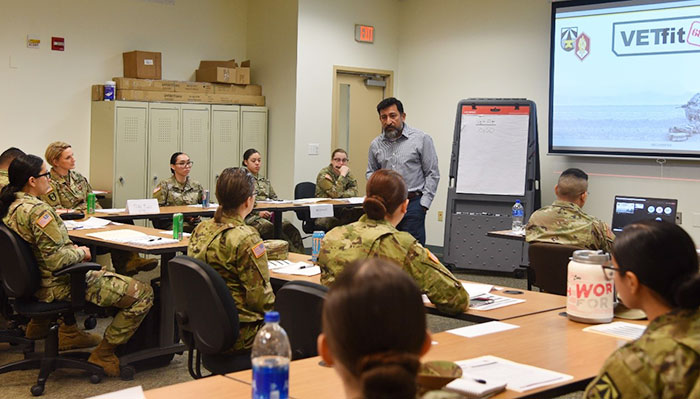USAMRDC 68-Tangos Talk Improvements for Animal Care Research Opportunities

Soldier career development and mentorship were the cornerstones of the 68-Tango Leader Forum hosted by U.S. Army Medical Research and Development Command leadership at Fort Detrick, Maryland, from March 24-25.
For two days, more than 60 research 68-Tangos gathered both in-person and virtually for the first time in USAMRDC history to identify opportunities and challenges affecting career progression, education and training and work-life balance. USAMRDC Command Sgt. Maj. Victor Laragione, who spoke to forum participants, believes 68-Tangos possess unique capabilities to care for military working dogs and family pets, and perform vital research as well.
"What you are trained to do is amazing," said Laragione." There is no other medical MOS that does what you do. All the way through dental care, the laboratory, X-ray and surgery, you do it all."
Army 68-Tangos are like veterinary technicians, who help care for and research the health of animals. 68-Tangos are the only branch that supports veterinarian care across the services. They assist Army veterinarians in delivering medical care, performing surgical procedures and conducting research on diseases passed from animals to humans. However, research 68-Tangos perform different duties than Tangos who work outside of research, states Master Sgt. Zachary Phillips, non-commissioned officer in charge, Center of Enabling Capabilities, USAMRDC Walter Reed Army Institute of Research.
"Instead of thinking direct impact, Soldiers are working on research studies that may happen 10-20 years down the road," said Phillips. "There is an indirect impact, and you might not see the results while you are in the Army, but the focus has to be on long-term improvements and long-term products."
The forum emphasized how the command's priority for individual medical readiness supports the indirect impact and work of research 68-Tangos by cultivating career and network opportunities like the leader forum.
"This 68-Tango Leader Forum is the first of its kind when it comes to research 68-Tangos," Phillips said. "For the command to bring in Soldiers from institutes ranging from Texas to Massachusetts, to receive face-to-face training, and work together, was a big portion of the forum. When MRDC starts investing in the 68-Tangos financially, the investments are also career investments."
Guest speaker Richard Gonzales, a lead trainer for the VetFit veterinary resiliency program, discussed the importance of practicing mindfulness and self-care in a challenging position like caring for animals.
"The VetFit Program was created by the Walter Reed Army Institute of Research, and the focus is on veterinary resiliency specifically for research Tangos," said Phillips. "Not only is MRDC bringing in 68-Tangos from all around the country to have this leader forum, but they are developing products for 68-Tangos within MRDC."
Forum participants were given the opportunity to share their needs with leadership and their peers to perform better mentally in such a unique and challenging role. Improving the work culture for 68-Tangos begins with an understanding of their volume of work, states Staff Sgt. Rachel Hammill, non-commissioned officer in charge at USAMRDC's U.S. Army Institute of Surgical Research.
"Our research directorate is the one who drives our mission and what we support. It is important to have balance and an understanding of the operational tempo we are at because there are so many expectations," said Hammill.
Near the conclusion of the event, instructors discussed career mapping efforts for 68 Tangos and common assignments they can pursue as an animal care specialist – either sergeant or NCO – as well as other veterinary operations positions.
"For Research Tangos specifically, you get to work with exotic animals that you may never encounter in real life, except maybe at a zoo. In general, your opportunities are limitless from the animals you work with, to the jobs you have and the bases you can be stationed at," Phillips said.
 An official website of the United States government
An official website of the United States government
 ) or https:// means you've safely connected to the .mil website. Share sensitive information only on official, secure websites.
) or https:// means you've safely connected to the .mil website. Share sensitive information only on official, secure websites.


